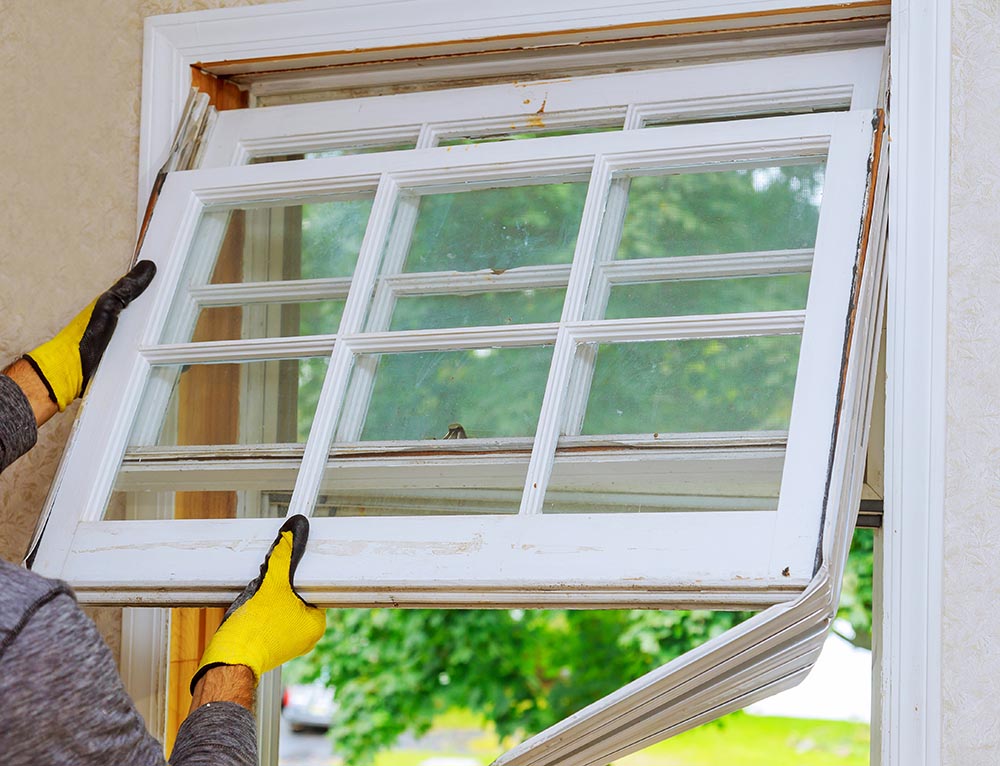For many homeowners, trying to keep the home maintained and performing at a high level is an overwhelming task. Our homes are made up of individual components, and each of these components must hold up and stand the test of time—which means that choosing quality products and providing careful maintenance, and keeping up with repairs and replacements every year is critical to its performance. Your roof needs your attention throughout the seasons. The siding needs to not only look good but also be able to handle every type of weather. The gutters need to run free and clear from clogs. And the list goes on, and on.
One component of the home that is often misunderstood is windows. Different styles, energy efficiency ratings, material quality, and the number of panes all play a role in how well a window performs. For those with single-pane windows, now is always a good time to reevaluate what those windows are actually doing to improve your home—and how upgrading them can vastly improve the experience you have as a homeowner.
Single-pane windows do still have their place despite the recent advancements made in the window industry. However, the benefits of single-pane windows are for the most part obsolete—and replacing yours could be one of the best investments you make for your home.
Pros and Cons of Single-Pane Windows
For the most part, single-pane windows are not recommended. Improvements to windows have come a long way since single-pane windows were the norm, and your single-pane windows are likely aging and in need of replacement.
That said, if you have single-pane windows, you should evaluate them according to your needs and situation. To truly understand how viable single-pane windows are in your case, it helps to understand what’s good and bad about them. That’s why we’ve kept things simple by breaking things down into pros and cons as follows:
Pros
Cheaper: Compared to double and triple pane windows, this option is incredibly cheap and budget-friendly.
Lighter weight: The more panes your window has, the heavier they are. For some homeowners, upgrading to thicker windows can result in the need to reinforce the walls. This isn’t a concern with single-pane windows.
Multiple choices: You can get this window in a variety of materials and styles to suit your needs.
Historic: For those with older homes, this type of window can lend authenticity to the house, adding character. This is especially true if the windows are original ones.
Cons
Poor energy-efficiency: This window is a poor insulator and often gets cold in the winter and hot in the summer. This has a direct effect on your energy bill.
Poor noise reduction: With only one sheet of glass, you’re not going to block out those loud neighbors or other unwanted sounds.
Greater long-term expense: Yes, they are cheaper at first, but the increase to your energy bill and the need for repairs and other sources of insulation can result in greater expense down the road.
Pros and Cons of Double-Pane Windows
If you’re interested in upgrading your single-pane windows to a better option, you may want to consider double-pane windows. Double-pane windows your single-pane windows, let’s take a look at how double-pane windows actually stack up. Their pros and cons are:
Pros
Better insulation: This is an easy one. More panes equal better insulation, which can save you money down the road.
Improved noise reduction: If this is a concern for you then you’ll want double-pane windows to block out the unwanted noise present in the outside world.
Increased resale value: Double-pane windows are looked on more favorably as a rule when considering resale value.
Cons
Higher upfront cost: This window costs more upfront including the installation itself. As such, this may not be viable for everyone, despite the long-term savings potential.
No single replacements: With double-pane windows, you need to replace most or all of the windows with them to get any value out of them.
Should I Replace my Single-Pane Windows?
At this point, you have an idea of how each window compares to the other, but does that mean you need to replace your single-pane windows? The answer is usually yes. As we mentioned before, single-windows are outdated and inefficient, and replacing them with modern ones offers plenty of benefits that make the investment worth it. You should really consider doing so if the following apply:
High repair costs: It’s possible to repair your windows in most cases. However, when the cost to repair is nearly as much or more than it would cost to just replace them, then it’s time to consider replacement windows.
Increasing energy bills: This is a sign of window failure if you’re noticing your energy bill is rising faster than would be expected. This is because single-pane windows just don’t withstand the test of time as well.
Uncomfortable: Has it been difficult to control the temperature in your home lately? In the winter, single-pane windows can allow too much of a draft inside the house, while the opposite happens in the summertime. Bad insulation leads to an overworked air conditioning system, uncomfortable indoor temperatures, and excessive energy costs.
Constant Repairs: Are you constantly doing repairs to fix your single-pane windows? Single-pane windows are often older, more fragile, and tend to shatter easily. If you find yourself spending a lot of time, money, and energy keeping up your single-pane windows, switching to double-pane is worth considering.
Investing in Single-Pane Windows
For a long-term investment, you are truly better off choosing double-pane windows over single-pane windows nearly every single time. With double-pane windows, you can expect better energy efficiency, soundproofing, and even possibly a better resale value.
In addition to the other reasons, it’s been proven that quality double-pane windows installed correctly leave homeowners better protected against problems such as mold growth or faded furniture to name a couple. It also doesn’t hurt that today double-pane windows are more available than single-pane windows making it the better market choice.
Despite the clear benefit of double-pane windows, there are cases where it might be more appropriate to stick to single-pane windows. For example:
Historic home: If your home is old enough to have period windows and be considered historic, then you’ll want to keep the single-pane windows to maintain that authentic look and feel.
Unique windows: Some windows are unique to the style of your home meaning you won’t find it in your basic hardware store. In this case, it’s potentially better to stick to single-pane.
Stained glass: If some of your windows are stained glass, then you’ll want to avoid investing in double-pane windows.
At the end of the day, the decision is yours. With that in mind, there is one more important piece to the puzzle you need before making a move. You need a qualified window contractor that can help walk you through the decision-making process. A qualified contractor will know whether it’s time to upgrade the windows. More importantly, they will know how to do it properly the first time.
When choosing your window and contractor, there are two important things to consider. These two things are the manufacturer warranty and the installation warranty. The manufacturer warranty will help you in the event the window itself fails. The installation warranty is to cover you if the installation was performed incorrectly. Make sure you carefully review both before committing to a course of action.
If you’re interested in switching out your old, aging single-pane windows with double, triple, or even quadruple-pane window products, let the team at Smart Exteriors know. We’re experts in window replacement and help Kansas City area homeowners get the most out of their investments into their home with the smartest and most affordable products on the market. For more information, give us a call now or fill out our online form to schedule a free consultation for your new windows.

